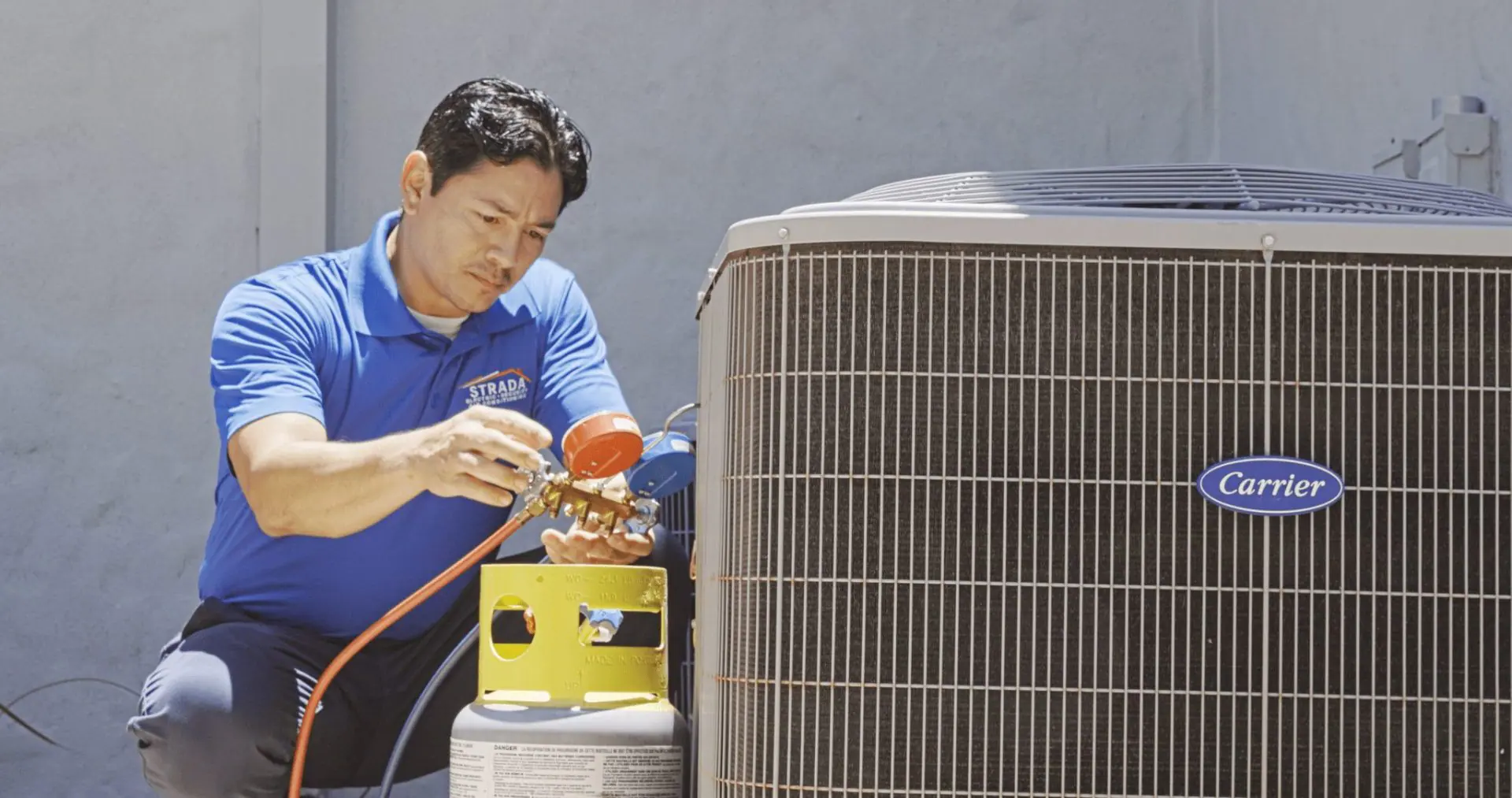A Comprehensive Guide to Cooling And Heating Jobs: Abilities, Training, and Job Prospects
The cooling and heating sector is a dynamic area that calls for a distinct collection of abilities and training. Professionals have to possess strong interaction and analytic capacities while paying very close attention to information. Vocational training and accreditations are vital for those looking to enter this sector. As need for energy-efficient modern technologies grows, so do task prospects. Understanding the paths and requirements can open varied opportunities within this industry. What are the crucial elements that can affect occupation innovation?
Essential Abilities for Heating And Cooling Professionals
Technological expertise is vital, Heating and cooling experts have to likewise possess a varied collection of essential skills to succeed in their area. Communication abilities are paramount, as service technicians usually engage with customers to explain complex concerns and solutions in understandable terms. Problem-solving capacities are equally important; experts must fix and detect heating and cooling system breakdowns efficiently.

Additionally, strong focus to detail assurances that repair work and setups are completed properly, reducing prospective issues. Physical stamina and mastery are required, given the needs of the task, consisting of raising hefty equipment and functioning in constrained spaces.
Time administration skills permit HVAC professionals to focus on tasks effectively, assuring prompt solution shipment. Versatility is important in a swiftly advancing sector where brand-new innovations and methods arise regularly. Jointly, these skills enhance a cooling and heating specialist's efficiency, guaranteeing they meet client demands while maintaining high requirements of solution.

Training and Qualification Needs
To stand out in the cooling and heating industry, individuals need to undertake details training and obtain appropriate qualifications that confirm their skills and expertise. Typically, aspiring HVAC professionals begin with a senior high school diploma or matching, complied with by trade training or an associate degree in heating and cooling modern technology. These programs often cover fundamental principles, system design, and repair service techniques.
In enhancement to official education, acquiring accreditations from identified organizations, such as the Environmental Defense Company (EPA) and North American Professional Excellence (NATE), is necessary. EPA accreditation is required for handling refrigerants, while NATE qualification demonstrates proficiency in various cooling and heating topics.
Hands-on experience via internships or instructions further improves an individual's credentials. Continuous education is also essential, as the cooling and heating industry develops with brand-new innovations and policies. By meeting these training and certification needs, people place themselves for success in an affordable job market.
Job Paths in the Cooling And Heating Sector
With the necessary training and certifications in place, individuals can discover various job courses within the HVAC sector. Typical roles include a/c service technician, who does repair services, setup, and upkeep of heating, air flow, and a/c systems. An additional choice is coming to be a HVAC engineer, focusing on system my website layout and efficiency, usually requiring advanced education in engineering principles.
In addition, individuals may pursue sales roles, focusing on cooling and heating services and products, which demand solid interaction abilities and technological understanding. Some might choose to progress into management positions, supervising teams and tasks while ensuring conformity with market standards. Moreover, chances exist in energy bookkeeping, where professionals examine power use in buildings and advise improvements. Each course uses one-of-a-kind difficulties and benefits, dealing with varied skill sets and interests within the a/c field.
Task Prospects and Employment Opportunities
The a/c industry flaunts a solid need for qualified experts, driven by the recurring requirement for climate control systems in domestic, commercial, and industrial setups. As energy effectiveness and ecological sustainability ended up being progressively essential, the demand for experienced specialists continues to rise. Work prospects are particularly favorable for those with specialized training and certifications, as employers look for individuals with the current expertise in energy-efficient modern technologies and clever cooling and heating systems.
According to market records, the employment of a/c specialists is predicted to grow considerably over the next years, showing the industry's resilience even throughout economic fluctuations. In addition, as older systems call for replacement and new structures arise, chances include both skilled specialists and newcomers. Several HVAC firms are likewise broadening their services, producing further openings (HVAC Jobs Only). On the whole, people getting in the cooling and heating field can expect a durable task market, with adequate chances for development and stability
Tips for Progressing Your A/c Career
As professionals navigate their cooling and heating professions, seeking continuous education and learning and specialized training can significantly boost their improvement leads. Involving in qualification programs, such as those supplied by North American Service Technician Quality (NATE) or the Refrigeration Solution Engineers Society (RSES), can considerably improve a professional's credibility and expertise base. Networking within the market is similarly essential; participating in profession shows, workshops, and local market occasions can open up doors to new possibilities and collaborations.
Additionally, acquiring experience in varied locations, such as business systems or power effectiveness modern technologies, allows specialists to become well-rounded experts - HVAC Jobs Only. Establishing soft abilities, including communication and problem-solving capabilities, is essential for those aiming for managerial or management roles. Staying informed about industry trends and arising innovations assurances that Cooling and heating experts remain competitive in a quickly progressing area, placing them for lasting profession success.

Regularly Asked Questions
What Is the Typical Income for HVAC Technicians?
The ordinary salary for heating and cooling professionals varies by place and experience however usually ranges between $40,000 and $60,000 each year. Elements such as accreditations and field of expertise can greatly affect gaining possible in this area.
Exist Specialized Heating And Cooling Fields to Think About?
Yes, there are specific HVAC areas, including household, business, and commercial HVAC, along with areas like refrigeration, energy monitoring, and interior air quality. Each specialization uses special skills and career chances within the market.
Just How Can I Discover HVAC Work Openings?
To find heating and cooling job openings, people should explore online job boards, business internet sites, industry-specific online forums, and neighborhood profession colleges. Connecting with specialists best site in the field can additionally discover surprise opportunities and prospective job leads.
What Devices Are Essential for Heating And Cooling Work?
Essential tools for HVAC work consist of multimeters, refrigerant assesses, pipeline wrenches, air pump, and leak detectors. These instruments enable service technicians to diagnose, repair, and keep air, home heating, and air flow conditioning systems efficiently and efficiently.
Can I Function in A/c Without Accreditation?
Yes, one can work in HVAC without certification, although opportunities might be restricted. Lots of companies choose licensed prospects, and people without accreditation may find his explanation it challenging to advancement in their professions or gain access to certain work settings.
To excel in the Cooling and heating market, people need to undergo details training and get pertinent certifications that validate their skills and expertise. Typically, aspiring Cooling and heating professionals begin with a high college diploma or equivalent, followed by vocational training or an associate level in A/c technology. With the necessary training and qualifications in location, individuals can discover various career courses within the A/c market. According to industry records, the work of HVAC professionals is predicted to grow considerably over the following years, showing the market's strength also during financial fluctuations. Yes, there are specialized A/c areas, including household, industrial, and industrial HVAC, as well as locations like refrigeration, energy administration, and indoor air quality.